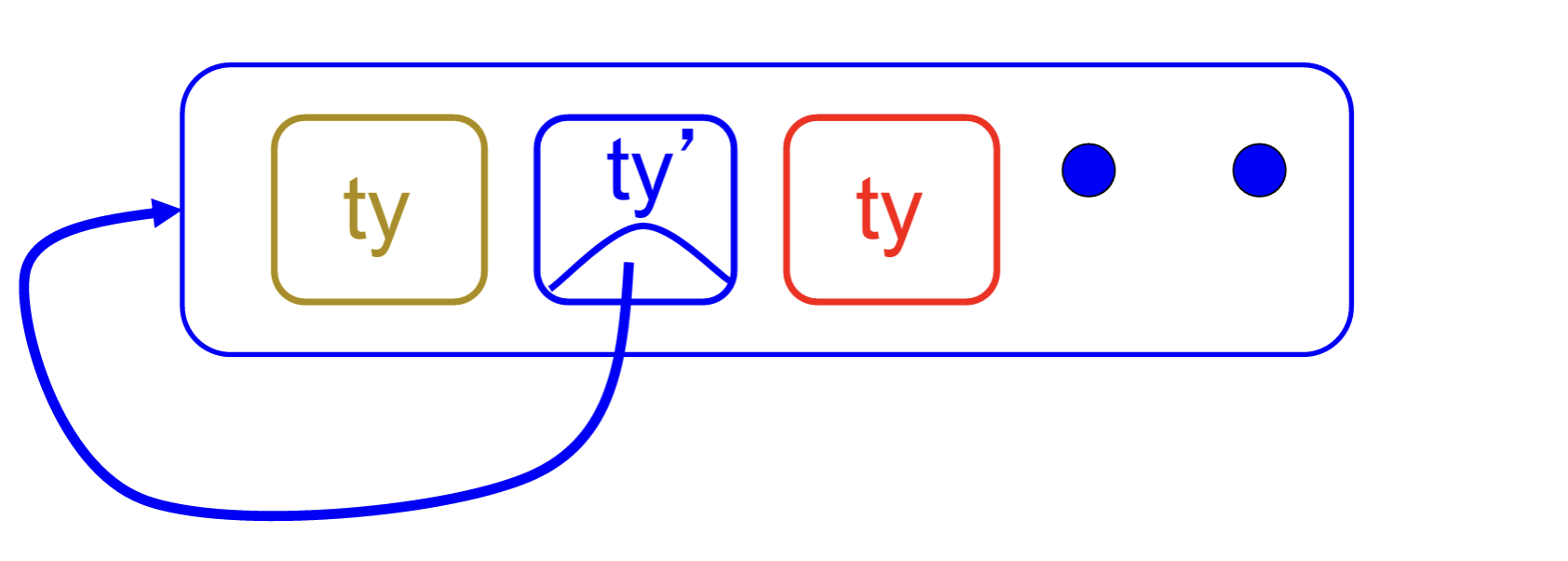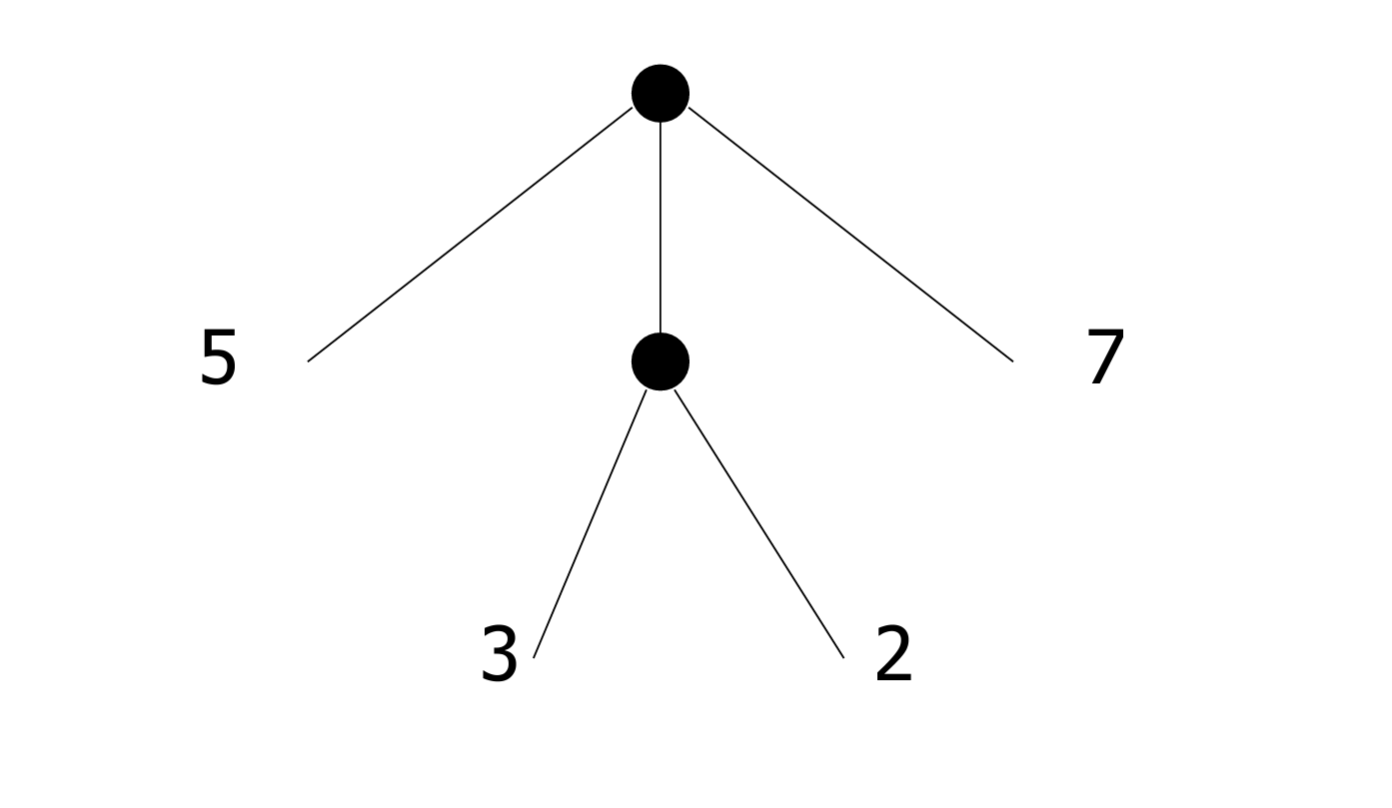Terminology: Review
- A function is in Direct Style when it returns its result back to the caller.
- A function is in Continuation Passing Style when it, and every function call in it, passes its result to another function.
- A Tail Call occurs when a funciton returns the result of another fucntion call without any more computations (e.g. tail recursion)
- Instead of returning the result to the caller, we pass it forward to another function giving the computation after the call.
- Instead of returning the result to the caller, we pass it forward to another function giving the computation after the call.
CPS Transformation
- Step 1: Add continuation argument to any function definition:
-
Let f arg = e
- Idea: Every function takes an extra parameter saying where the result goes
- Step 2: A simple expression in tail position should be passed to a continuation instead of returned:
-
return a
- Assuming a is a constant or variable.
- “Simple” = “No available function calls.”
- Step 3: Pass the current continuation to every function call in tail position.
-
return f arg
- The function “isn’t going to return,” so we need to tell it where to put the result.
- Step 4: Each function call not in tail position needs to be converted to take a new continuation (containing the old continuation as appropriate)
-
return op (f arg)
- op represents a primitive operation
-
return g(f arg)
Example
Example 2
Data type in Ocaml: lists
- Frequently used lists in recursive program
- Matched over two structural cases
-
-
- Covers all possibel lists
-
- Not quite legitimate declaration because of special syntax
Variants - Syntax (slightly simplified)
-
- Introduce a type called name
-
-
- Constructors are the basis of almost all pattern mathcing
Enumeartion Types as Variants
An enumeration type is a collection of distinct values
In C and Ocaml they have an order structure; order by order of input
type weekday = Monday | Tuesday | Wednesday | Thursday | Friday
| Saturday | Sunday Functions over Enumerations
let day_after day = match day with
Monday -> Tuesday
| Tuesday -> Wednesday
| Wednesday -> Thursday
| Thursday -> Friday
| Friday -> Saturday
| Saturday -> Sunday
| Sunday -> Monday
let rec days_later n day =
match n with 0 -> day
| _ -> if n > 0
then day_after (days_later (n -1) day)
else days_later (n + 7) day# days_later 2 Tuesday;;
- : weekday = Thursday
# days_later (-1) Wednesday;;
- : weekday = Tuesday
# days_later (-4) Monday;;
- : weekday = ThursdayProblem:
Write a function
let is_weekend day =
match day with
Saturday -> true
| Sunday -> true
| _ -> falseExample Enumeration Types
type bin_op = IntPlusOp | IntMinusOp
| EqOp | CommaOp | ConsOp
type mon_op = HdOp | TlOp | FstOp
| SndOpExplanantion of
We create a type name bin_op (short for binary operator), which can take one of the following five values:
-
-
-
-
-
Explanantion of
We create a type name mon_op (short for monadic or unary operator), which can take one of the following five values:
-
-
-
-
-
Disjoint Union Types
Disjoint union types, with some possibly occurring more than once
We can also add in some new singleton elements
type id = DriversLicense of int
| SocialSecurity of int | Name of string
let check_id id = match id with
DriversLicense num ->
not (List.mem num[13570; 99999])
| SocialSecurity num -> num < 900000000
| Name str -> not (str = "John Doe")Problem:
Create a type to represent the currencies for US, UK, Europe and Japan
type currency =
Dollar of int
| Pound of int
| Euro of int
| Yen of intExample Disjoint Union Type
type const =
BoolConst of bool
| IntConst of int
| FloatConst of float
| StringConst of float
| NilConst
| UnitConst
type const = BoolConst of bool
| IntConst of int | FloatConst of float
| StringConst of string | NilConst
| UnitConst- How do we represnet 7 as a const?
-
Answer:
Polymorphism in Variants
-
The type
type `a option = Some of `a | None- Used to encode partial functions
- Often can replace the raising of an exception
Functions producing option
# let rec first p list =
match list with [] -> None
| (x::xs) -> if p x then Some x else first p xs
val first : (`a -> bool) -> `a lost -> a` option = <fun>
# first (fun x -> x > 3) [1;3;4;2;5];;
- : int option = Some 4
# first (fun x -> x > 5) [1;3;4;2;5];;
- : int option = NoneFunctions over option
# let result_ok r =
match r with None -> false
| Some _ -> true;;
val result_ok : `a option -> bool = <fun>
# result_ok (first (fun x -> x > 3) [1;3;4;2;5]);;
- : bool = true
# result_ok (first (fun x -> x > 5) [1;3;4;2;5]);;
- : bool = falseProblem:
- Write a hd and tl on lists that doesn’t raise an exception and works at all types of lists.
let hd list =
match list with [] -> None
| (x::xs) -> Some x
let tl list =
match list with [] -> none
| (x::xs) -> Some xsMapping over Variants
# let optionMap f opt =
match opt with None -> None
| Some x -> Some (f x)
val optionMap : (`a -> `b) -> `a option -> `b
option = <fun>
# optionMap (fun x -> x - 2)
(first (fun x -> x > 3) [1;3;4;2;5]);;
- : int option = Some 2Folding over Variants
# let optionFold someFun noneVal opt =
match opt with None -> noneVal
| Some x -> someFun x;;
val optionFold : (`a -> `b) -> `b -> `a option ->
`b = <fun>
# let optionMap f opt =
optionFold (fun x -> Some(f x)) None opt;;
val optionMap : (`b -> `b) -> `a option -> `b
option = <fun>Recursive Types
- The type being defined may be a component of itself
Recursive Data Types
type int_Bin_Tree =
Leaf of int | Node of (int_Bin_Tree * int_Bin_Tree)Recursive Data Types Values
let bin_tree =
Node(Node(Leaf 3, Leaf 6), Leaf(-7))Recursive Functions
let rec first_leaf_value tree =
match tree with (Leaf n) -> n
| Node (left_tree, right_tree) ->
first_leaf_value left_tree
# let left = first_leaf_value bin_tree
val left : int = 3Recursive Data Types
type exp =
VarExp of string
| ConstExp of const
| MonOpAppExp of mon_op * exp
| BinOpAppExp of bin_op * exo * exp
| IfExp of exp * exp * exp
| AppExp of exp * exp
| FunExp of string * exp# type bin_op = IntPlusOp | IntMinusOp | EqOp | CommaOp
| ConsOp | ...
# type const = BoolConst of bool | IntConst of int |
...
# type exp = VarExp of string | ConstExp of const |
BinOpAppExp of bin_op * exp * exp | ...- How to represent 6 as an exp?
- Answer: ConstExp (IntConst 6)
- How to represent (6, 3) as an exp?
- BinOpAppExp (CommaOp, ConstExp (IntConst 6), ConstExp(IntConst 3))
- How to represent [(6, 3)] as an exp?
- BinOpAppExp(ConstOp, BinOpAppExp(CommaOp, ConstExp(IntConst 6), ConstExp(IntConst 3)), ConstExp NilConst)
Problem
type int_Bin_Tree = Leaf of int
| Node of (int_Bin_Tree * int_Bin_Tree)- Write sum_tree : int_Bin_Tree -> int
-
Adds all ints in tree
let rec sum_tree t =
let rec sum_tree t =
match t with Leaf n -> n
| Node(t1, t2) -> sum_tree t1 + sum_tree t2- How to count the number of variables in an exp?
let rec varCnt exp =
match exp with VarExp x -> 1
| ConstExp c -> 0
| BinOpAppExp (b, e1, e2) -> varCnt e1 + varCnt e2
| FunExp (x, e) -> 1 + varCnt e
| AppExp (e1, e2) -> varCnt e1 + varCnt e2Mapping over Recursive Types
let rec ibtreeMap f tree =
match tree with (Leaf n) -> Leaf (f n)
| Node (left_tree, right_tree) ->
Node (ibtreeMap f left_tree, ibtreeMap f right_tree)
# ibtreeMap ((+) 2) bin_tree;;
- : int_Bin_Tree = Node (Node (Leaf 5, Leaf 8), Leaf(-5))Folding over Recursive Types
# let rec ibtreeFoldRight leafFun nodeFun tree =
match tree with Leaf n -> leafFun n
| Node (left_tree, right_tree) ->
nodeFun
(ibtreeFoldRight leafFun nodeFun left_tree)
(ibtreeFoldRight leafFun nodeFun right_tree);;
val ibtreeFoldRight : (int -> `a) -> (`a -> `a -> `a) ->
int_Bin_Tree -> `a = <fun>
# let tree_sum =
ibtreeFoldRight (fun x -> x) (+);;
val tree_sum : int_Bin_Tree -> int = <fun>
# tree_sum bin_tree;;
- : int = 2Mutually Recursive Types
type `a tree = TreeLeaf of `a
| TreeNode of `a treeList
and a` treeList = Last of `a tree
| More of (`a tree * `a treeList);;
type `a tree = TreeLeaf of `a | TreeNode of `a
treeList
and `a treeList = Last of `a tree | More of (`a
tree * `a treeList)Mutually Recursive Types - Values
let tree =
TreeNode
(More (TreeLeaf 5,
More(TreeNode
More(TreeLeaf 3,
Last(TreeLeaf 2))),
Last (TreeLeaf 7)))A more conventional picture
Mutually Recursive Functions
# let rec fringe tree =
match tree with (TreeLeaf x) -> [x]
|(TreeNode list) -> list_fringe list
and list_fringe tree_list =
match tree_list with (Last tree) -> fringe tree
| (More (tree, list)) ->
(fringe tree) @ (list_fringe list);;
val fringe : `a tree -> `a list = <fun>
val list_fringe : `a treeList -> `a list = <fun>
# fringe tree;;
- : int list = [5; 3; 2; 7]Problem
# type `a tree = TreeLeaf of `a | TreeNode of `a a treeList
and `a treeList = Last of `a tree | More of (`a tree * `a treeList);;let rec tree_size t =
match t with TreeLeaf _ -> 1
| TreeNode ts -> treeList_size ts
and treeList_size ts =
match ts with Last t ->
| More t ts` -> tree_size t + treeList_size ts`Nested Recursive Types
type `a labeled_tree =
TreeNode of (`a * `a labeled_tree list)
let ltree =
TreeNode(5,
[TreeNode (3, []);
TreeNode (2, [TreeNode (1, []);
TreeNode (7, [])]);
TreeNode (5, [])])




